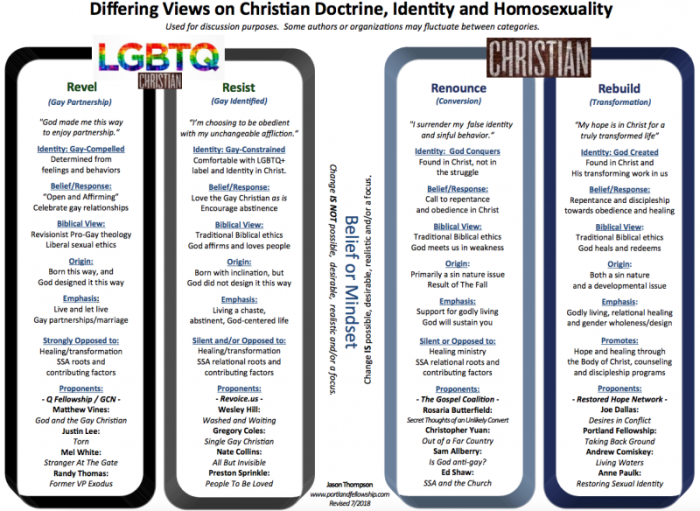Revoice Conference Reveals Church's Failure to Address LGBT Issues

Robert* grew up in a strong Christian family and attended a large, conservative evangelical church. In high school, he was active in his church's youth group. and after graduating, attended a conservative Christian college and got involved in ministry.
By all appearances, Robert was a well-adjusted and healthy, young Christian man. Yet during college, Robert confessed to his family and Christian friends that he struggled with attraction to other men.
Robert's family and Christian friends responded with love and compassion. His parents didn't shun or shame him, but instead expressed support. Similarly, Robert's friends continued to include him in their social group. And his church responded with open arms, allowing him to serve in leadership, so long as he resisted acting upon his same-sex desires.
Yet no one seemed to know how to help Robert.
His parents sent him to a secular therapist, who helped Robert recognize some unhealthy relational patterns in his family and process an incident of sexual abuse from middle school. Robert found this helpful, but it didn't lessen his same-sex attraction.
The leaders at Robert's church tried to be sympathetic to his struggle. And in an effort to show they were listening, they went with Robert and a family member to a conference sponsored by the Gay Christian Network (GCN) – now Q Christian Fellowship. But this conference only convinced Robert that his same-sex attraction was immutable and encouraged him to embrace gay identity. Soon after the conference, he did. And shortly after that, he began engaging in gay relationships.
Robert's church leaders didn't condone Robert's behavior and urged him to resist his same-sex desires. A few times, Robert repented of his homosexual behavior and vowed to stop. But after three years of struggle, Robert gave in. He began living openly as a gay man and left his church. His parents left too, and began attending a gay-affirming, mainline church.
Robert's story is heartbreaking, but it is also increasingly common. There was a time when the majority of conservative, evangelical churches believed that healing was possible for sexually broken people, even if very few knew how to administer that healing. But now all the church seems capable of offering is a sympathetic ear. Few offer any hope of deliverance. Few believe in supernatural power. All that's left is handwringing and the ineffectual repeating of biblical prohibitions. It's no wonder conservatives are rapidly losing ground when it comes to LGBTQ issues..
The Revoice Conference & the Church's Failure
This sad state of affairs in the church is on full display this summer as conservative Christians debate the upcoming Revoice Conference. This conference at the end of July has been endorsed by several leading evangelicals and is being held at a church in the Presbyterian Church in America (PCA) – generally regarded as a more conservative, biblically-faithful denomination. Revoice organizers also state on their website that they "believe that the Bible restricts sexual activity to the context of a marriage covenant, which is defined in the Bible as the emotional, spiritual, and physical union of a man and a woman that is ordered toward procreation."
Yet as several conservative Christian leaders have rightly noted, Revoice crosses a line that biblically-orthodox Christians should not cross – that is, it claims that LGBT identity is compatible with Christianity. The Revoice website openly states, "We envision a future Christianity where LGBT people can be open and transparent in their faith communities about their orientation and/or experience of gender dysphoria without feeling inferior to their straight, cisgender brothers and sisters."
As Al Mohler, president of The Southern Baptist Theological Seminary, recently noted in a podcast, this language is significant – and problematic. "What is implied in that language?" he asks. "Well, at least a part of what's implied . . . is that this kind of sexual orientation or sexual identity gets right to the very being of an individual."
Embracing gay identity clearly contradicts Scripture. As the apostle Paul makes abundantly clear in 2 Corinthians 5:16-17, believers root their identity in Christ, not their sin tendencies. "From now on, therefore, we regard no one according to the flesh . . . " Paul writes. "Therefore, if anyone is in Christ, he is a new creation. The old has passed away; behold, the new has come."
Yet as Revoice shows, embracing gay identity is becoming increasingly popular among Christians. In fact, it is a hallmark of two of the four major views in the church regarding LGBTQ issues. And sadly, among the two other views, only one proclaims any hope to those struggling with same-sex and transgender issues.
The Four Main Views on LGBTQ Issues
As the graphic below produced by Portland Fellowship illustrates, there are four schools of thought within the church regarding LGBTQ issues. The "revel" school encourages both embrace of gay identity and behavior. The "resist" school encourages embrace of gay identity, but not behavior. The "renounce" school rejects both gay identity and behavior, but is silent or opposed to any efforts to heal sexual brokenness. And only one school, labeled "rebuild," proclaims hope and healing to those struggling with same-sex and transgender issues.

(Graphic: https://www.portlandfellowship.com/resources/differingviews.pdf)
The Revoice conference falls squarely within the "resist" category. Though it's commendable that those within this camp reject gay behavior, their embrace of gay identity is tragic.
But Revoice organizers go even further. They actually suggest that LGBT identity can be a virtue. As presenter Grant Hartley states, "Christians have often discarded the virtues of queer culture along with the vices . . . So questions that have until now been largely unanswered remain: what does queer culture (and specifically, queer literature and theory) have to offer us who follow Christ? What queer treasure, honor, and glory will be brought into the New Jerusalem at the end of time (Revelation 21:24-26)?"
That Christians would suggest that "queer culture" has "virtues" or a "glory" that might be included in the "New Jerusalem" is shocking, and I appreciate that leaders like Mohler, Owen Strachan, Kevin DeYoung, Richard D. Phillips, and others have addressed these glaring problems with the Revoice conference.
Yet pointing out these problems is not enough. If the church is going to effectively address LGBTQ issues, it must offer hope of sexual redemption. But many conservative Christian leaders are afraid to do so. They land squarely in the "renounce" camp – quick to renounce error, but slow, or even unwilling, to offer any solution. This must change.
Two weeks ago, I spoke at Hope 2018 – a conference hosted by Restored Hope Network (RHN), a network of Bible-believing, Holy Spirit-empowered ministries offering precisely the kind of gospel-centered transformation that Scripture describes. At the conference, I heard testimonies from numerous people who have been liberated from same-sex desires just as 1 Corinthians 6:11 suggests.
The conference didn't promise instant liberation, nor that God would make everyone straight. But it did proclaim the gospel – that the same power that raised Jesus from the grave is at work in us, and that no brokenness, including sexual brokenness, is beyond God's redemption.
This is the message every church should be proclaiming, but few do. Sadly, RHN and other ministries in the "rebuild" camp have been marginalized in the church. They're often dismissed as "ex-gay" ministries that simply advocate that same-sex attracted persons "pray the gay away."
But this is a gross caricature of the deep soul care and healing ministry that those in the "rebuild" camp offer. Yes, these groups believe in the power of prayer – and how sad that many in the church apparently do not. But they are often led by people who have walked the difficult road to sexual wholeness and understand what's required to do so.
What they advocate is not easy, but it is biblical. It's what theologians have long referred to as progressive sanctification – the doctrine that as a believer walks with God, he becomes progressively more holy or Christlike. This process is not limited to one's sexual desires, but it certainly includes them. And it's stunning that many otherwise-orthodox Christians are shrinking from openly advocating this doctrine as it applies to same-sex and transgender issues.
Christian leaders need to understand that when we fail to proclaim the full gospel, we invite heresy and unbiblical solutions. As Paul David Tripp and Timothy S. Lane write in How People Change, what happens when people turn to the church for help crucially impacts their view of the gospel:
Their experience will either encourage them (and others) to see the power of the gospel or convince them that the gospel is not enough to deal with life's problems. If the latter happens, the local church becomes a place of confusion. The impact and influence of the gospel is weakened significantly, or totally replaced by another message and method of change.
This is precisely what has happened in the evangelical church. We have failed to apply the full gospel to the LGBT issue, and as a result, people are confused and are embracing non-gospel centered solutions. This is why Revoice is happening. This is why the gay Christian movement is gaining momentum. And this is why people like Robert, who struggle with same-sex attraction, are finding no help in our churches, and are defecting.
If we truly love people like Robert, and truly believe the gospel, we must move from simply renouncing error to proclaiming the hope of transformation. Yes, this is counter-cultural and will meet with resistance. Yes, this is risky and puts our faith on the line. But this is the way of Christ and the only way to successfully address the LGBTQ issue at this critical moment in the life of the church.
*Not his real name.




























